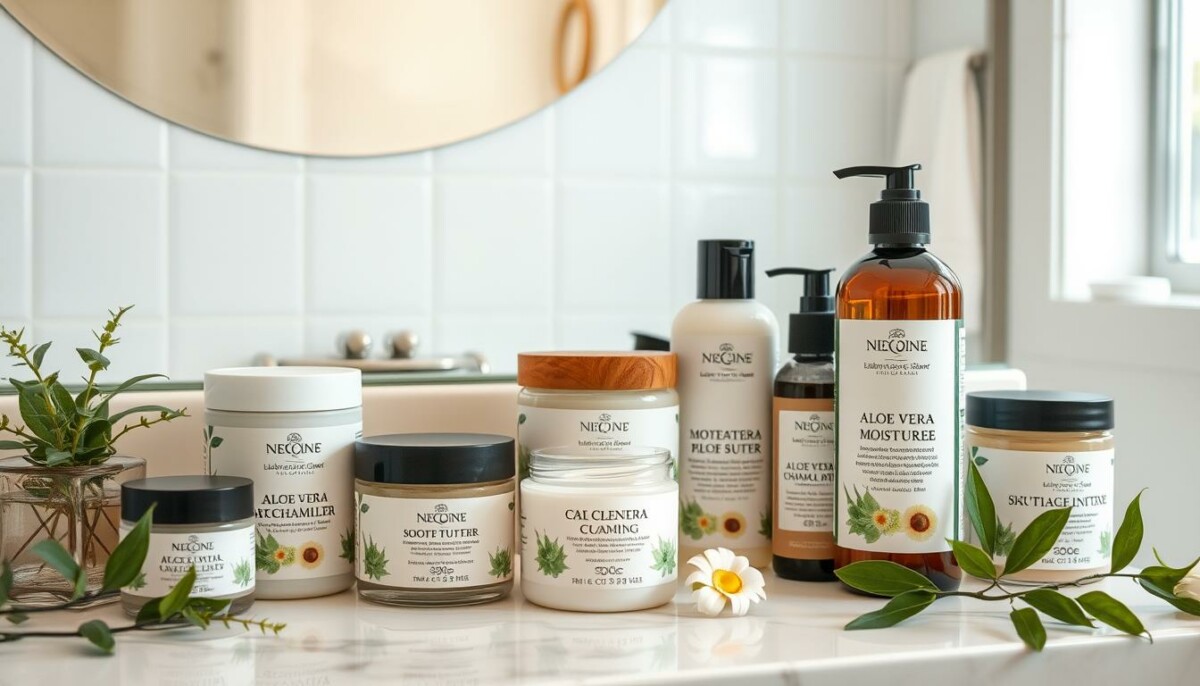Choosing the right skincare products is key for sensitive skin. Organic skincare is a top choice because it uses natural ingredients that are gentle yet effective. In this article, we’ll dive into organic skincare and share our top picks for sensitive skin. We’ll cover everything from organic to natural skincare, helping you make smart choices for your routine.
Finding the right products for your skin can be tough. That’s why we’ve created this guide. It’s here to help you find the best organic skincare for your sensitive skin. Whether you need a gentle cleanser or a moisturizer, we’ve got you covered. Our aim is to give you the knowledge and tools to create a skincare routine that works for you, using organic and natural products.
Key Takeaways
- Organic skincare products are a great option for sensitive skin
- Natural ingredients are gentle and effective
- Choosing the right products is crucial for taking care of sensitive skin
- Our guide will help you navigate the world of organic skincare
- We will provide you with our top picks for sensitive skin
- Creating a skincare routine with organic skincare and natural skincare products can be easy and effective
Understanding Sensitive Skin and Why Organic Matters
For sensitive skin, a gentle approach is key. Knowing what sensitive skin is helps find the right products. These products should soothe and calm the skin. Organic products are great for this, as they use natural ingredients that are less likely to irritate.
Choosing organic for sensitive skin care is smart. Look for products without harsh chemicals and artificial fragrances. Organic products are gentle, reducing irritation and promoting healthy skin. They offer a natural way to care for your skin.
Common Signs of Sensitive Skin
- Redness and inflammation
- Itching and burning sensations
- Irritation and rashes
Benefits of Choosing Organic Products
Organic products are great for sensitive skin. They offer many benefits, including:
- Reduced risk of skin irritation
- Improved skin health
- A more natural approach to skincare
Key Differences Between Natural and Organic Skincare
Natural and organic skincare are often confused, but they differ. Natural skincare might have synthetic ingredients. Organic skincare, on the other hand, uses only natural ingredients. For sensitive skin, choose organic products certified by a reputable body, like the USDA.
| Skincare Type | Ingredients | Certification |
|---|---|---|
| Natural Skincare | May contain synthetic ingredients | No certification required |
| Organic Skincare | Made with only natural ingredients | Certified by a reputable organization, such as the USDA |
Essential Ingredients to Look for in Organic Skincare Products for Sensitive Skin
Choosing the right gentle skincare is key for sensitive skin. Look for products with organic ingredients to avoid harsh chemicals. Ingredients like aloe vera and green tea soothe the skin. Natural moisturizers like coconut oil and shea butter are also great.
Organic skincare products can calm and nourish your skin. This reduces skin irritation and helps your skin look healthy. Here are some important ingredients to look for:
- Aloe vera: known for its soothing and calming properties
- Green tea: rich in antioxidants and anti-inflammatory compounds
- Coconut oil: a natural moisturizer that helps to hydrate and nourish the skin
- Shea butter: a rich and creamy moisturizer that helps to lock in moisture and protect the skin
Choosing organic skincare with these ingredients can help sensitive skin. Always check the label for organic and chemical-free products. This way, you can avoid skin irritation and get a healthy glow.
With the right gentle skincare and knowledge, you can keep your skin healthy. Switch to organic ingredients for a balanced and radiant complexion. It’s a simple step towards better skin.
| Ingredient | Benefits |
|---|---|
| Aloe vera | Soothes and calms the skin, reducing inflammation and irritation |
| Green tea | Rich in antioxidants and anti-inflammatory compounds, helping to protect the skin from damage |
| Coconut oil | Nourishes and hydrates the skin, helping to lock in moisture and promote a healthy complexion |
Best Organic Cleansers for Delicate Skin Types
Choosing the right cleanser is key for delicate skin. Organic cleansers are gentle and effective. They are free from harsh chemicals and artificial fragrances.
Organic cleansers use natural ingredients that work well with the skin. This provides gentle skincare for delicate skin types.
There are many organic cleanser types, like cream, oil, and foam. Each has its own benefits. Cream cleansers are good for dry and sensitive skin. Oil-based cleansers are great for removing makeup and impurities. Foam cleansers are best for normal to combination skin.
Cream Cleanser Options
- Avalon Organics Intensive Moisturizing Cream Cleanser
- Burt’s Bees Sensitive Skin Cream Cleanser
- Jason Natural Cream Cleanser
Oil-Based Cleansers
- Shu Uemura Cleansing Beauty Oil
- DHC Deep Cleansing Oil
- Dr. Hauschka Cleansing Oil
Gentle Foam Cleansers
- Cetaphil Gentle Skin Cleanser
- Neutrogena Hydrating Facial Cleanser
- La Roche-Posay Toleriane Ultra Fluid Face Wash
When picking an organic cleanser, look for “gentle” or “hypoallergenic” labels. These are less likely to irritate your skin. Always check the ingredient list and avoid harsh chemicals or artificial fragrances. Organic cleansers and gentle skincare routines help keep delicate skin healthy and balanced.
| Product | Key Ingredients | Skin Type |
|---|---|---|
| Avalon Organics Intensive Moisturizing Cream Cleanser | Aloe vera, vitamin E | Dry and sensitive skin |
| Shu Uemura Cleansing Beauty Oil | Green tea, camellia oil | Normal to combination skin |
| Cetaphil Gentle Skin Cleanser | Glycerin, panthenol | All skin types |
Top-Rated Organic Moisturizers That Won’t Irritate
Finding the right moisturizer for sensitive skin can be tough. It’s key to pick one that hydrates well without irritating. Organic moisturizers are great because they use natural ingredients that are kind to the skin. Look for ones with hyaluronic acid, ceramides, and niacinamide for their soothing and hydrating effects.
Brands like Burt’s Bees and Acure offer top organic moisturizers for sensitive skin. These products avoid harsh chemicals and artificial scents. Always check the ingredient label and look for USDA Organic or EWG Verified certifications to ensure the product is organic and natural.

Using an organic moisturizer right is crucial to avoid irritation. Apply it right after bathing or showering, when your skin is still wet. Also, use a gentle, organic cleanser and toner to keep your skin’s pH balanced and reduce irritation. With the right organic moisturizer and a gentle skincare routine, you can have healthy, hydrated skin without irritation.
- Look for organic moisturizers containing natural ingredients like hyaluronic acid and ceramides
- Choose products from reputable brands like Burt’s Bees and Acure
- Follow a consistent skincare routine to reduce the risk of skin irritation
By carefully choosing an organic moisturizer and sticking to a gentle skincare routine, you can enjoy the benefits of organic moisturizers. These include less skin irritation and long-lasting hydration.
Soothing Organic Serums and Treatments
Finding the right skincare for sensitive skin can be tough. Organic serums and treatments offer extra nourishment and protection. They help calm and soothe irritated skin. It’s key to find products that are gentle and won’t irritate.
Anti-inflammatory serums are great for sensitive skin. They reduce redness and inflammation. Ingredients like aloe vera and green tea are used because they’re natural and soothing. Facial creams and masks also help by keeping moisture in and protecting from the environment.
Barrier-repair products are also good for sensitive skin. They fix and strengthen the skin’s barrier. This reduces irritation and inflammation. Adding these products to your routine keeps your skin healthy and calm.
Benefits of Organic Serums
- Reduced risk of irritation and inflammation
- Improved skin hydration and moisture
- Nourishment and protection for sensitive skin
When looking for organic serums and treatments, search for “soothing” or “calming” labels. Choose products with anti-inflammatory ingredients. The right products in your routine keep your skin happy and healthy.
Ingredients to Avoid When You Have Sensitive Skin
When choosing natural skincare, it’s key to watch the ingredients, more so for sensitive skin. Some ingredients can irritate, cause redness, and discomfort. Knowing what to avoid is crucial.
Common irritants include essential oils, fragrances, and dyes. These can be too harsh for sensitive skin, leading to bad reactions. Also, hidden ingredients like sulfates, parabens, and phthalates can make skin irritation worse.
Common Irritants in Natural Products
- Essential oils: can be too harsh for sensitive skin
- Fragrances: can cause allergic reactions
- Dyes: can irritate the skin and cause redness
Hidden Ingredients to Watch For
| Ingredient | Potential Harm |
|---|---|
| Sulfates | Can strip the skin of its natural oils |
| Parabens | Can cause hormonal imbalances |
| Phthalates | Can cause skin irritation and allergic reactions |
To steer clear of these ingredients, always check the labels. Opt for products marked as safe for sensitive skin or hypoallergenic. Being careful with natural skincare ingredients helps protect your skin and keeps it healthy and glowing.

Building Your Organic Skincare Routine
Starting an organic skincare routine can feel daunting, even for those with sensitive skin. First, understand your skin type and what it needs. Think about whether your skin is dry, oily, or sensitive when picking products for your organic skincare routine.
A solid organic skincare routine includes a gentle cleanser, a moisturizer that nourishes, and a serum that protects. When picking products, aim for natural skincare items that are both gentle and effective. Ingredients like aloe vera, chamomile, and green tea are great choices.
Here are some tips to help you build your organic skincare routine:
- Start simple and add more products as you go
- Opt for “fragrance-free” or “hypoallergenic” products to avoid irritation
- Give your skin time to adjust to new products
Remember, everyone’s skin is unique, so finding the right organic skincare routine for your sensitive skin might take time. With patience and persistence, you can craft a organic skincare routine that makes your skin look and feel amazing.
How to Patch Test New Organic Products
When you start using new organic skincare, it’s key to do a patch test, even more so if your skin is sensitive. This simple step can prevent bad reactions and make sure the product fits your skin type. Patch testing is vital for adding new products to your routine, as it shows how your skin reacts to the ingredients.
To begin patch testing, pick a hidden spot on your skin, like behind your ear or on your wrist. Put a small amount of the product there and wait 24-48 hours to see if any issues arise. This waiting time is important to know if the product is okay for your sensitive skin.
Step-by-Step Testing Process
- Choose a test area: Select a discreet area of your skin, such as behind your ear or on your wrist.
- Apply the product: Apply a small amount of the product to the test area.
- Wait and observe: Wait for 24-48 hours to see if any reaction occurs.
Keep an eye out for signs like redness, itching, or burning while waiting. If you notice any, stop using the product and look for another one. By following these steps and watching your skin, you can keep your organic skincare routine safe and effective for your sensitive skin.
Conclusion: Embracing Gentle, Organic Skincare for Lasting Results
Embracing gentle, organic skincare is key for lasting, healthy results on sensitive skin. Choosing organic skincare products without harsh chemicals helps. This way, people with sensitive skin can get a nourished, radiant look.
Always test new products on a small area first. Then, create a skincare routine that fits your skin’s needs perfectly.
The path to glowing, sensitive skin starts with gentle, organic skincare. Look for products with soothing, nourishing ingredients. These help support your skin’s natural barrier and balance.
With the right organic skincare routine, you can say goodbye to redness and dryness. Hello to a healthy, vibrant complexion.
FAQ
What are the common signs of sensitive skin?
Signs of sensitive skin include redness, itching, and stinging. You might also feel burning or experience dryness.
What are the benefits of choosing organic skincare products?
Organic skincare products are good for sensitive skin. They reduce irritation and improve skin health. They use gentle, natural ingredients.
What are the key differences between natural and organic skincare?
Organic skincare is certified to be free from synthetic chemicals. It’s grown without pesticides or harmful additives.
What are some essential ingredients to look for in organic skincare products for sensitive skin?
Look for soothing agents like aloe vera and green tea. Also, natural moisturizers like coconut oil and shea butter are good.
What are the best types of organic cleansers for delicate skin types?
For sensitive skin, cream, oil-based, and gentle foam cleansers are best. They don’t strip the skin’s natural oils.
What are some top-rated organic moisturizers that won’t irritate sensitive skin?
Look for moisturizers with natural ingredients like hyaluronic acid and ceramides. Niacinamide is also good for hydrating and soothing.
What are some soothing organic serums and treatments for sensitive skin?
Anti-inflammatory serums, hydrating treatments, and barrier-repair products are good for sensitive skin.
What ingredients should be avoided when you have sensitive skin?
Avoid essential oils, fragrances, and dyes. Also, stay away from harsh chemicals like sulfates, parabens, and phthalates.
How can you build an effective organic skincare routine for sensitive skin?
Choose the right products and layer them properly. Adjust your routine based on your skin type and concerns.
How do you properly patch test new organic skincare products?
Apply a small amount to a discrete area of your skin. Watch for any reactions. Follow a testing timeline to ensure safety.



